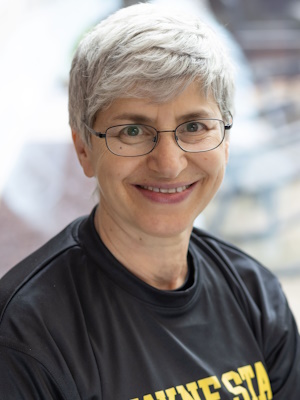
Anwar Najor-Durack
Assistant Professor, Clinical and Assistant Dean for Student Affairs
Expert in Evidence-Based Practice in social work education, field education and workforce development
5447 Woodward Avenue, Rm 165(313) 577-4479
Anwar Najor-Durack
Biography
Najor-Durack began her tenure at the School of Social Work in 1994 as the M.S.W. academic advisor, in 2005 she was appointed to direct the Office of Field Education and in 2019 named as the Assistant Dean for Student Affairs. Her research area includes the use of Evidence-Based Practice (EBP) in social work education, fieldwork and workforce development. Her practice experience spans mental health, family work, and workforce development in child welfare and integrated care settings.
Najor-Durack has worked closely with various faculty in the School of Social Work to develop programs to better prepare social work students for professional practice. She has served as the principle investigator and co investigator on various grants, including Hartford Foundation, SAMHSA and HRSA training grants helping to prepare students for professional practice in integrated settings.
Responsibilities
Najor-Durack oversees both the Office of Admissions and Student Services and the Office of Practicum Education within the School of Social Work.
Degrees and Certifications
- Ph.D., Wayne State University
- M.S.W., Wayne State University
- B.S., Wayne State University
Pronouns
she/her/hers
Grand Challenges Project
A Strong Child Welfare Workforce
Najor-Durack and Associate Dean for Research Joanne Sobeck are working to promote a strong child welfare workforce in Michigan through Wayne Together – Child Welfare Learning and Leadership Collaborative in partnership with the Michigan Department of Health and Human Services. Aimed at increasing recruitment and retention in this vital workforce area, the federally funded initiative trains select M.S.W. students for child welfare positions with an expanded curriculum and a rotational field education placement in child protection, foster care, and adoption. It also provides coaching, workshops, and continuing education to publicly and privately employed child welfare staff in Wayne County.
Now completing its third year, the collaborative receives support from partners that include the Wayne County Department of Health and Human Services, Vista Maria, Judson Center, The Children’s Center, Christ Child House and Forever Families. In addition to coursework and field training, the program offers lunch-and-learn sessions, career development workshops, and self-care activities as a means of coping with the stress of child welfare work. Students selected to join the program earn a stipend to assist with tuition and other educational expenses. Learn more
Screening for Risky Substance Use
With $1 million from the Substance Abuse and Mental Health Services Administration (SAMHSA), the School of Social Work and the Wayne State College of Nursing are training social work and nursing students to assess patients in primary care settings for substance use with Screening, Brief Intervention and Referral to Treatment (SBIRT). Similar to screenings for diabetes, hypertension and other chronic diseases, SBIRT helps health care providers identify risk levels for substance use and to employ early, appropriate interventions that can prevent escalation. These include education about related risks, motivation to change behaviors and — in the most serious cases — referrals to specialty care. The first university in Michigan to receive a SAMHSA grant to train students in SBIRT, Wayne State began the three-year initiative in 2015 and has trained 151 students at the undergraduate and graduate levels. Najor-Durack and Associate Nursing Professor Feleta Wilson developed the training curriculum with an interprofessional team of nursing and social work faculty that included Associate Social Work Professor Antonio González-Prendes and Assistant Social Work Professor Suzanne Brown. The program has also trained more than 20 health care professionals at Detroit-area hospitals and treatment centers where Wayne State students trained in the screening tool are receiving field instruction. Learn more
Recent university news spotlights
- Workforce Development: Investing in the next generation of social workers, health care workers and our community
- $1 million HRSA grant supports collaborative project to enhance community-focused behavioral health education and practice
- New child welfare training initiative coming to WSU includes financial support for students
- New Screening Brief Intervention Referral to Treatment (SBIRT) initiative provides free Continuing Education to WSU students and community members
- Here for you: School of Social Work launches initiative to increase mental health providers in Wayne County schools